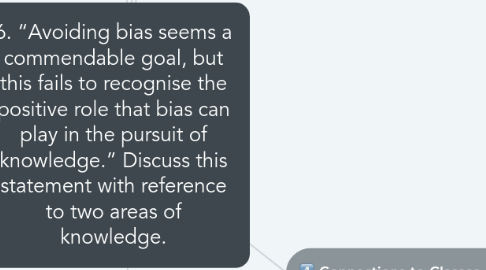
1. Keywords
1.1. commendable
1.1.1. A goal which is worth pursuing as it increases the quality and usefulness of the knowledge
1.2. Avoiding
1.2.1. Not consciously or subconsciously using any bias whatsoever in the acquisition or creation of knowledge
1.3. Bias
1.3.1. The influence of the prior knowledge of the producers and acquirers of knowledge on the knowledge they produce or acquire, through affecting their methodology and interpretation.
1.3.1.1. Methodology
1.3.1.1.1. (conscious choice as to how to approach the production or acquisition of knowledge, as well as unconscious choices which cause their applied methodology to deviate from the theoretical one)
1.3.1.2. Interpretation
1.3.1.2.1. the way in which knowledge is acquired or produced, based on the data, source material, or inspiration
1.4. Knowledge
1.4.1. The understanding of how to do something, or how it functions
1.5. Goal
1.5.1. Something that should be strived for
1.6. Fails
1.6.1. Does not
1.7. recognise
1.7.1. Acknowledge
2. Key Phrases
2.1. pursuit of knowledge
2.1.1. The production of knowledge
2.1.2. The acquiring of knowledge
2.2. positive role
2.2.1. Improving the ____ of knowledge
2.2.1.1. quality
2.2.1.2. usefulness
2.3. seems commendable
2.4. fails to recognise
2.4.1. Does not even acknowledge the positive role of bias
3. Rewrite
3.1. Avoiding the use of past knowledge and presuppositions in the production or acquisition of knowledge is often seen as increasing the quality of the knowledge produced or acquired, but this ignores the ways in which bias can (and is in fact needed to) produce valuable knowledge (as defined by its quality and usefulness)
4. Connections to Classes
4.1. History
4.1.1. History
4.1.2. Avoiding bias fails to recognise the positive role that bias can play in the production and acquisition of knowledge
4.1.2.1. The Subaltern school of Indian historiography tries to tease out the voice of the subaltern
4.1.2.1.1. Concepts
4.1.2.1.2. Framework Area
4.1.2.1.3. WOKS
4.1.3. Although bias plays a positive and necessary role in the production and acquisition of knowledge, avoiding certain biases can improve the quality of knowledge.
4.1.3.1. In Julia Lovell's book "The Opium War: Drugs, dreams and the making of China" she avoids bias by selecting both Chinese and Western sources, and forming an interpretation which does not fall into line with the Western-produced historical knowledge of China in the 20th Century (eg. J. K. Fairbank).
4.1.3.1.1. WOKS
4.1.3.1.2. Framework Area
4.1.3.1.3. Concepts
4.1.3.1.4. Ways of knowing
4.1.3.2. Alternatively I could cut the middle-woman and just use Fairbank's books
4.1.4. KQs
4.1.4.1. To what extent does bias reduce the value of the historical knowledge produced?
4.1.4.2. To what extent do historians actually neglect the use of bias?
4.1.4.3. Is the truth the goal of all Historical inquiry?
4.1.4.4. What counts as a fact in history?
4.1.4.5. If it is difficult to establish proof in history, does that mean that all versions are equally acceptable?
4.2. Human sciences
4.2.1. Human sciences
4.2.2. All philosophical truths are axiomatic/relative, and as a result bias is required in the production of philosophical knowledge.
4.2.2.1. RLE/PK Connection
4.2.2.1.1. TOK Concept
4.2.2.1.2. Framework Area
4.2.3. Counterclaim
4.2.3.1. RLE/PK Connection
4.2.3.1.1. TOK Concept
4.2.3.1.2. Framework Area
4.2.4. KQs
4.2.4.1. Is there an absolute truth in philosophy?
4.3. Chemistry
4.3.1. Natural sciences
4.3.2. In the natural sciences, bias towards adhering to established knowledge leads to the creation of more valuable knowledge
4.3.2.1. Due to bias towards established laws (Einstein's laws), and experiments based on those laws which detected gravitational waves, scientists were able to deduce that much of heavy metals came from neutron star collisions
4.3.2.1.1. Reason
4.3.2.1.2. Historical development
4.3.2.1.3. Bias
4.3.2.2. "If I have seen further it is by standing on the shoulders of Giants." - Isaac Newton
4.3.3. However, avoiding bias towards established knowledge can lead to the production of new, useful knowledge
4.3.3.1. The gold leaf experiment disproved the plum pudding model, and led to the discovery of the positive nucleas and to Rutherford's model
4.3.3.1.1. Imagination
4.3.3.1.2. Historical development
4.3.3.1.3. Bias
4.3.3.1.4. Faith
4.3.3.2. When quantum theory started getting too far, Einstein refused to accept it, stating the "he does not play dice"
4.3.3.2.1. Concepts
4.3.4. KQs
4.3.4.1. To what extent is bias involved in the production of knowledge in the natural sciences? Is bias as significant in the production of knowledge in the natural sciences as it is in history?
4.3.4.2. To what extent is established knowledge objective knowledge?
4.3.4.3. To what extent is it necessary to avoid bias towards established knowledge to produce new knowledge?
4.3.4.4. Are scientific models true?
